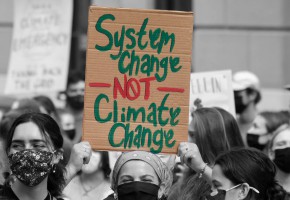
Challenging the Hurdles on the Pathway to an Effective COP29 - Amena Sharaf & Shereen Talaat
Challenging the Hurdles on the Pathway to an Effective COP29 - Amena Sharaf and Shereen Talaat (MenaFem Movement)
Introduction:
Climate change is disproportionately affecting countries in the Global South, those that are least responsible for causing the crisis. Every year Africa, MENA, Asia-Pacific, Latin America and the Caribbean carry the cost of escalating climate change in destroyed infrastructure, crop failure, lands disappearing beneath the sea, ruined livelihoods, and lost lives. The thirst for economic growth from the Global North built on fossil fuels, has created a bottomless demand for energy while condemning the Global South to climate-induced poverty, displacement, deepening debt, and hunger. On the pathway to COP29, the region joins others in calling on Global North governments to meet their obligation to cut their outsized emissions as rapidly as possible and pay for the climate chaos they have caused in the Global South.
Structural Challenges and Regional Considerations:
Feminist Pursuits: Equity of Finance
As a new global goal on climate finance is set to be negotiated at the UN COP29[1] summit in Baku, Azerbaijan this November, it is critical that governments address the broken promises of developed countries, starting from all the way from the Kyoto Protocol of 1993 which developing countries failed in achieving its goal of cutting emissions[2] and ending with the looming failure of meeting the goal limiting warming to 1.5 degrees[3] in the Paris Agreement[4]. These failures on climate action and finance are jeopardising the safety and inhabitability of the planet[5]. The new climate finance goal must be framed within the context of the climate debt, offering a crucial opportunity to reset the planet’s future with a renewed commitment to genuine climate ambition. Lack of public finance in both climate action and social programs increase the vulnerability of the most marginalised groups due to the absence of social safety nets[6]. This is particularly true in the MENA region where many climate catastrophes run rampant[7].
Ahead of COP29, the feminist movement in the region and globally joined the efforts of debt,climate,trade and youth movements through the #PayUp[8] campaign, calling on the Global North to repay the climate debt owed to the Global South. Committed to dismantling the structural roots of oppression and exploitation, there’s an emphasis on the critical need for public finance that prioritizes collective human rights, gender equity, transparency, accountability, and enhanced access. This requires delivering grant-based finance to address the unsustainable levels of debt[9] and the shrinking fiscal space faced by many countries in the MENA region and other regions in the global south. Such funding must directly address and rectify existing failures, particularly in social support and safety net systems, without which, the climate crisis will only exacerbate the unpaid care burden shouldered predominantly by women[10]. Grant-based finance also recognizes that the climate debt is part of a broader historical and ongoing social, economic, and ecological debt, one that has been accumulated through centuries of colonialism, imperialism, patriarchy, and racist exploitation.
Choices Made: Militarization and Climate Finance
Militarization is a significant contributor to greenhouse gas (GHG) emissions due to its operations and infrastructure[11]. Ironically, there are some calls on “low-emission” military equipment[12], perhaps a testament to the lack of vision of some climate-protection efforts. An equitable and safe future for all is unquestionably threatened by the military operations themselves, not only the GHG emissions resulting from the operations carried out. Beyond lives lost, they cause land and natural habitat destruction, disrupting local ecosystems and biodiversity[13]. Use of explosives and military chemicals can contaminate soil, making it less arable and damaging the flora and fauna and destruction of crops[14]. Additionally, weaponry contaminates rivers and groundwater with fuel spills, heavy metals, and chemicals from munitions, impacting drinking water and agriculture. Disruption of irrigation systems can lead to food shortages and increased reliance on imported food impacting local economies and ecosystems. Women face many of these challenges head on, as the keeps of food sovereignty in developing countries[15] through their role in agriculture as well as their role in social cohesion, both the primary effects of conflict and its rampant climate effects[16].
In recent years, the European Investment Bank (EIB) has pledged to align its activities with the Paris Agreement and has set a target to become a climate bank, committing to dedicate at least 50% of its financing to climate-related projects by 2025[17]. And yet, the bank has included defence finance to Israel in its adopted Strategic Roadmap 2024-2027[18], contributing to the rising number of deaths, as well as the climate ramifications of wide military operations, prompting global movements to call on the EIB to align its strategies with International Human Rights Law[19]. The recent genocide in Gaza, Palestine has been estimated to cause massive damage to the environment regionally and in terms of GHG emissions[20]. It is one of many examples of financing military operations in proxy wars in the MENA region while barely meeting nations’ climate finance obligations. For example, the US defence budget was $858 billion in 2023[21], while climate finance in the same year under the Biden administration was $44.9 billion[22]. Worth noting, the $44.9 billion in climate finance is spread over multiple climate-oriented activities and action[23]. Despite the drastic effects of militarization on the environment and its soaring climate cost, the UNFCCC only acknowledges these climate ramifications in principle through CSO submissions[24], without any procedures to at least provide a framework of accountability.
Progression through Representation:
Challenging the systemic drivers of the climate crisis and advancing gender equity in the discussions is necessary to reshape a more sustainable and inclusive world. Last February the Women and Gender Constituency (WGC) – one of 9 official observer constituencies representing civil society under the UNFCCC, particularly at the nexus of gender, climate, and environment joined in a letter by observer constituencies, as well as over 180 civil-society organizations in the just demand for gender equality to be centered in the COP29 Presidency and outcomes. The letter was urging COP29 President for action and call to respond and share the tangible steps to ensure that gender equality remains a key cross-cutting issue in every decision made in addition to requesting a commitment to advancing women's leadership and ensuring a strong gender balance in all aspects of climate change decision-making. This approach can reinforce the feminist perspective while maintaining a strong call for action and accountability.
But the lack of formal response from the upcoming COP29 Presidency is deeply concerning. Despite months passing since WGC initial letter, and several communications from COP29 leadership, there has been no significant mention of any concrete plans, strategies, or support to ensure the successful renewal of the Enhanced Lima Work Programme and its Gender Action Plan[25]. With less than two months left before COP29, time is running out for the Presidency to engage parties and shape a truly gender-responsive climate future, one which directly impacts more than half of the world's population.
Amid these mounting challenges, there is still no clarity on how or when Parties will be consulted to bridge gaps and raise the political ambition necessary for gender-just action, action that should translate into truly gender-responsive, transformational new Nationally Determined Contributions (NDCs).
Sherine Talaat and Amna Sharaf are part of the MENAFEM movement for economic, ecological, and development justice in the Middle East and North Africa
Reference
[1] 29th Conference of Parties (COP) for the United Nations Framework Convention on Climate Change (UNFCCC)
[2] Helm, D (2012). ‘The Kyoto Approach Has Failed’. Nature 491(7426): 663–65. doi:10.1038/491663a. Available at: https://www.nature.com/articles/491663a
[3] The 1.5 degree goal means limiting the increase of global temperatures to 1.5 degrees from the pre-industrial global temperatures
[4]Paddison, L. (2024) The 1.5-degree climate goal may be ‘deader than a doornail,’ and scientists are bitterly divided over it, CNN. Available at: https://www.cnn.com/2024/01/18/climate/paris-climate-goal-threatened-intl/index.html
[5] Laybourn, L., Throp, H. and Sherman, S. (2023) 1.5°C – dead or alive? the risks to transformational change from reaching and breaching the Paris Agreement Goal, IPPR. Available at: https://www.ippr.org/articles/1-5c-dead-or-alive
[6]Costella, C. et al. (2023) Can Social Protection tackle emerging risks from climate change, and how? A framework and a critical review, Climate Risk Management. Available at: https://www.sciencedirect.com/science/article/pii/S221209632300027X
[7]Al Said, M. (2024) تغيرات أكثر تطرفًا في أنماط المناخ بالشرق الأوسط وشمال أفريقيا, Nature Middle East. Available at: https://www.natureasia.com/ar/nmiddleeast/article/10.1038/nmiddleeast.2024.146
[8]Menafem (2024) Feminists demand wealthy countries #PayUp their climate debt!, Menafem Movement. Available at: https://menafemmovement.org/feminists-demand-wealthy-countries-payup-their-climate-debt
[9] Menafem (2024) Debt demands & debunking distractions for climate action, Menafem Movement. Available at: https://menafemmovement.org/debt-demands-debunking-distractions-for-climate-action
[10]IDRC (2024) Recognizing women’s unpaid care work for Food Security and climate resilience, IDRC. Available at: https://idrc-crdi.ca/en/research-in-action/recognizing-womens-unpaid-care-work-food-security-and-climate-resilience
[11] Cottrell, L (2021) The military’s contribution to climate change, CEOBS. Available at: https://ceobs.org/the-militarys-contribution-to-climate-change/
[12]US Department of Defense (2023) Department of Defense Plan to Reduce Greenhouse Gas Emissions. Available at: https://media.defense.gov/2023/Jun/16/2003243454/-1/-1/1/2023-DOD-PLAN-TO-REDUCE-GREENHOUSE-GAS-EMISSIONS.PDF
[13] Cottrell, L (2021) The military’s contribution to climate change, CEOBS. Available at: https://ceobs.org/the-militarys-contribution-to-climate-change/
[14] ibid
[15]Samon, K. (2023) Feminist food sovereignty - the paradigm shift in confronting climate crisis, Asia Pacific Forum on Women, Law and Development (APWLD). Available at: https://apwld.org/feminist-food-sovereignty-the-paradigm-shift-in-confronting-climate-crisis/
[16]Janoch, E. et al (2024) ‘women in war: Leaders, Responders, and potential’ report, CARE. Available at: https://www.care.org/news-and-stories/resources/women-in-war/
[17]EIB (2020) EIB Group’s climate bank roadmap. Available at: https://www.eib.org/en/publications/the-eib-group-climate-bank-roadmap.htm
[18] EIB (2020) EIB Group 2024-2027 Strategic Roadmap. Available at: https://www.eib.org/en/publications/the-eib-group-climate-bank-roadmap.htm
[19]Menafem (2024) Military support to Israel from the EIB, Menafem Movement. Available at: https://menafemmovement.org/military-support-to-israel-from-the-eib/
[20]Nina Lakhani (2024) Emissions from Israel’s war in Gaza have ‘immense’ effect on climate catastrophe, The Guardian. Available at: https://www.theguardian.com/world/2024/jan/09/emissions-gaza-israel-hamas-war-climate-change#:~:text=Constructing%20the%20Gaza%20Metro%20%E2%80%93%20the,annually%2C%20according%20to%20the%20study
[21]Zengerle, P. (2022) U.S. Senate passes record $858 Billion defense act, sending Bill to Biden | Reuters. Available at: https://www.reuters.com/world/us/us-senate-backs-record-858-billion-defense-bill-voting-continues-2022-12-16
[22] Press Release (2022), President Biden’s FY 2023 Budget Reduces Energy Costs, Combats the Climate Crisis, and Advances Environmental Justice, The White House. Available at: https://www.whitehouse.gov/omb/briefing-room/2022/03/28/president-bidens-fy-2023-budget-reduces-energy-costs-combats-the-climate-crisis-and-advances-environmental-justice/
[23] ibid
[24] UNFCCC (2023), Submission to the UNFCCC Global Stocktake: Military and Conflict Emissions. Available at: https://unfccc.int/sites/default/files/resource/GST%20MILITARY%20EMISSIONS.pdf
[25] The Enhanced Lima Work Programme on Gender (2019), Gender and climate change. Proposal by the President, UNFCCC. Available at: https://unfccc.int/documents/204536
Recent publications

ANND Newsletter January 2026 - From Davos to the UPR: Between Promises, and Accountability
Related publications

An Alternative progressive cycle and a revitalized multilateral system - Roberto Bissio

